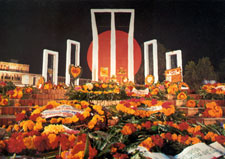 Bengali is one of the oldest of the modern languages of the sub-continent and the sixth-largest language group in the world with 235 million speakers. It is a derivative of Eastern Prakrit group of the Indo-Aryan family of languages. Bengali literature has had a considerable time to develop through the ages and has produced literary giants like Noble Laureate Tagore and the rebel poet Nazrul. Bengali is one of the oldest of the modern languages of the sub-continent and the sixth-largest language group in the world with 235 million speakers. It is a derivative of Eastern Prakrit group of the Indo-Aryan family of languages. Bengali literature has had a considerable time to develop through the ages and has produced literary giants like Noble Laureate Tagore and the rebel poet Nazrul.
Language is a people’s total identity. It effects and upholds their emotional, intellectual, social, cultural and historical integrity. It was to preserve this integrity as symbolised by their language that some young Bengalis gave their lives on 21 February 1952, which led to the recognition of Bengali as one of the state languages of Pakistan. This event eventually shaped the destiny of the land and its people culminating in the emergence of Bangladesh in 1971.
UNESCO-the educational and cultural offshoot of the United Nations proclaimed 21st February as the International Mother Language Day in November 1999. The resolution for this proclamation was tabled by Bangladesh and was co-sponsored by 27 countries including Pakistan and India. The UNESCO decision of designating particularly 21st February as the International Mother Language Day is in recognition of the Language struggle of 1952. The UNESCO declaration was given to develop fuller awareness about linguistic and cultural traditions throughout the world and to inspire solidarity based on understanding, tolerance and dialogue.
“Come, let us wrest our liberty,
the liberty to speak,
the liberty to place one letter
to the right of another
and make words,
the liberty to sing a hymn to life,
the liberty to make glowing utterance,
full of meaning and reason.”
War is perhaps the worst type of violence that poets should approve of. This was not untrue of poets, writers and indeed the people of Bangladesh in the pre-liberation period. A poem called “Not War, We Want Peace “ by a young poet of Bangladesh reflects this:
“Not war, bring peace
so these two nations can live as friends.
We want to live all our days together
in the same home-
what shall we gain by hoarding hate,
each in our private world ?”
The people of Bangladesh seldom opted for bloody struggle as a means of achieving their goal. The Bengalis took to arms because they had been threatened with the danger of being extinct as a nation. This feeling is echoed in a poem:
“I am not a warrior, never I have taken
the lesson of fighting……………..
……….yet I fight, I fight all the day
when they stretch out their hands
to snatch away from my bosom
a piece of green land
called the Country.”
During the nine months of war an unknown number of freedom fighters laid down their lives. But they are not defeated or lost that way. They are the country’s best heroes. The birth of the nation was made possible by their sacrifices.
“Your bones are indestructible storm in the heart of Bengal, the birth-moment of the Bengalis, the sixteenth of December, written in blood”
Independence is the dearest of things a civilised person longs for. The poet echoes the determination as well as the belief of a fighting nation:
“Raising echoes of a flaming declaration
from one end of the earth to the other,
flying a new flag,
sounding triumphant bugles everywhere,
you must come
to this Bengal,
O Liberty.”
|